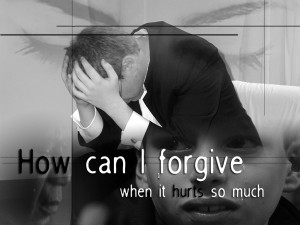Hate, Anger, Love, & Forgiveness
Hate, Anger, Love, & Forgiveness
 As you may know, Georgette and I have seven children – one boy and six girls. Our son, Harry, was born in 1981, ten months after we were married. Anna was born twenty-two months later, and Maria was born on Harry’s third birthday. We had an instant family – three babies in three years.
As you may know, Georgette and I have seven children – one boy and six girls. Our son, Harry, was born in 1981, ten months after we were married. Anna was born twenty-two months later, and Maria was born on Harry’s third birthday. We had an instant family – three babies in three years.
Our girls learned at an early age how to get what they wanted out of Harry. They also knew exactly which hot buttons to push to irritate him if he didn’t cooperate with them. One day in the late 1980’s when Harry was about seven years old, he got into an argument with Anna. Harry said what he wanted to say and then tried to end the conversation. Since Anna wasn’t done talking yet, she continued to drive home her point which caused Harry to become angry. She also made some comments that were offensive to him. Harry finally had enough and yelled, “I hate you!”
I was in another room when I heard Harry’s comment. I walked into the room he was in and said, “Harry you don’t really hate her do you?” His response was, “Yes, I do hate her.” At that point, I asked him if he could explain to me what the meaning of “hate” was. He was unable to come up with a satisfactory answer so I told him to go look it up in the dictionary, write out the definition on a sheet of paper, and then bring the paper to me so we could discuss what he found out.
Later in the evening, Harry approached me with his handwritten definition of “hate.” There were several different short definitions, including one that defined hate as “violent dislike.” We talked about the importance of showing respect for others and why we need to be careful about what words we use when communicating with others. I explained to him that regardless of how frustrated or angry he might get in the future, he was not allowed to ever tell any of his sisters that he hated them.
The following month, Harry and Anna got into another argument and it played out the same way as the previous argument. They argued and Anna pushed Harry to the boiling point, but this time Harry didn’t tell her he hated her. Instead, he yelled, “I violently dislike you!”
I never told Harry this, but I was actually kind of proud of him for not disobeying me and for figuring out a way to get around the rules.
Of course, we had another discussion about his name-calling and he agreed to refrain from using the word “hate,” and any other words that were derived from the word “hate.” To my knowledge, Harry did what I asked and never again told anyone he hated or violently disliked them. (As a side note, I recently looked up the word “hate” in the dictionary and the definition of “violent dislike” has been changed to “extreme dislike.” Someone must have determined that the old definition was not politically correct.)
Those of us who grew up in homes with good parents or attended good schools were taught that regardless of how we felt about another person, we were never to say “I hate you.” It was considered bad manners, inappropriate conduct, and rude behavior. We were shamed, ridiculed, or punished when we lost control of our emotions and said that phrase to someone (even though our statement may have been true). There was no tolerance for such inflammatory language. Unfortunately, in today’s culture, the same rules of etiquette don’t apply and more and more people are freely expressing their hate toward others.
There are generally two types of hate: (1) hate that is formed within us as a result of our own personal anger over the way we have been treated by one or more other people (“personal hatred”); and (2) hate toward a class or group of people that is the result of the conditioning we received from our parents, teachers, or other people who had influence over us while we were growing up (“class hatred”). The type of hate I’m addressing here today is the first type – personal hatred.
You’ve heard the saying, “Love is blind”? More often than not, hate is also blind in the sense that we’re not always completely aware of the true extent of the animosity and hate we may have for another person.
As followers of Jesus Christ, we know that we are expected to always forgive others for their wrongdoing. Every time we pray the Our Father, we say, “and forgive us our trespasses, as we forgive those who trespass against us.” We know that God’s forgiveness of us is contingent upon our forgiveness of everyone who has ever committed any offense against us. I don’t know about you, but there are times I don’t like that part of the Our Father prayer.
There is a perverted sense of self-satisfaction that we experience when we cling to our hated toward another person. This self-satisfaction emanates from our own pride. We feel justified and self-righteous in our anger toward the other person because of the actual or perceived mistreatment we have suffered. We become victims and we frequently seek out the support of family members or friends. Such support encourages us to feel justified in our anger toward the person.
The problem with hate is that it’s like acid. Regardless of whether it’s suppressed or not, it continues to eat away at our spiritual, mental, emotional, and physical well-being. And while it eats away at us, more often than not, the person we hate goes on with life without a full awareness of the extent of our animosity toward them.
It’s easier to talk about forgiveness than to actually forgive a person, especially if the person publicly humiliated us or committed a gravely offensive act against us.
Here is a simple (and powerful) technique that I learned several years ago on how to forgive another person:
Go into a quiet room where you will not be disturbed. Close your eyes and imagine that the person you are about to forgive is directly in front of you. In the theater of your mind, look straight into the eyes of the person. You have their undivided attention. Within your imagination, verbally unleash all your anger against the person. You are allowed to yell and scream and say whatever you want. Let the person know exactly how you feel and how much pain they have caused you. You will probably run out of things to say within five minutes. At that point, tell the person in a sincere tone of voice that despite all of the pain you have suffered, you forgive them.
After you have gone through this process, each time you are reminded of what the person did to you, tell yourself, It’s okay, I’ve already forgiven them for that. Then say a short prayer for the person, such as a Hail Mary. You do not need to make an effort to see or talk to the person in the future if you don’t want to.
If the person you have forgiven is a family member that you feel you should still be interacting with, such as a spouse, parent, adult son or daughter, there are other things you will need to do that are beyond the scope of this article. (If you are in that situation, you should regularly: (1) pray for the person; and (2) pray for the grace to develop the virtues of humility and heroic patience when interacting with the person.
If you use the technique I described to you to forgive another person, you will experience a great sense of relief and freedom. It will feel as though you have been released from bondage. More importantly, it will free up room in your heart and soul to expand the love you have for others.
Are you willing to forgive everyone who has ever offended or harmed you? If not, then you have no right to call yourself a Christian.




1 Comment
Again, well said, Harry!
You have a way with words to express very good ideas that seem to flow from your heart!
Thank you for being you, and for sharing…… Sister Roberta